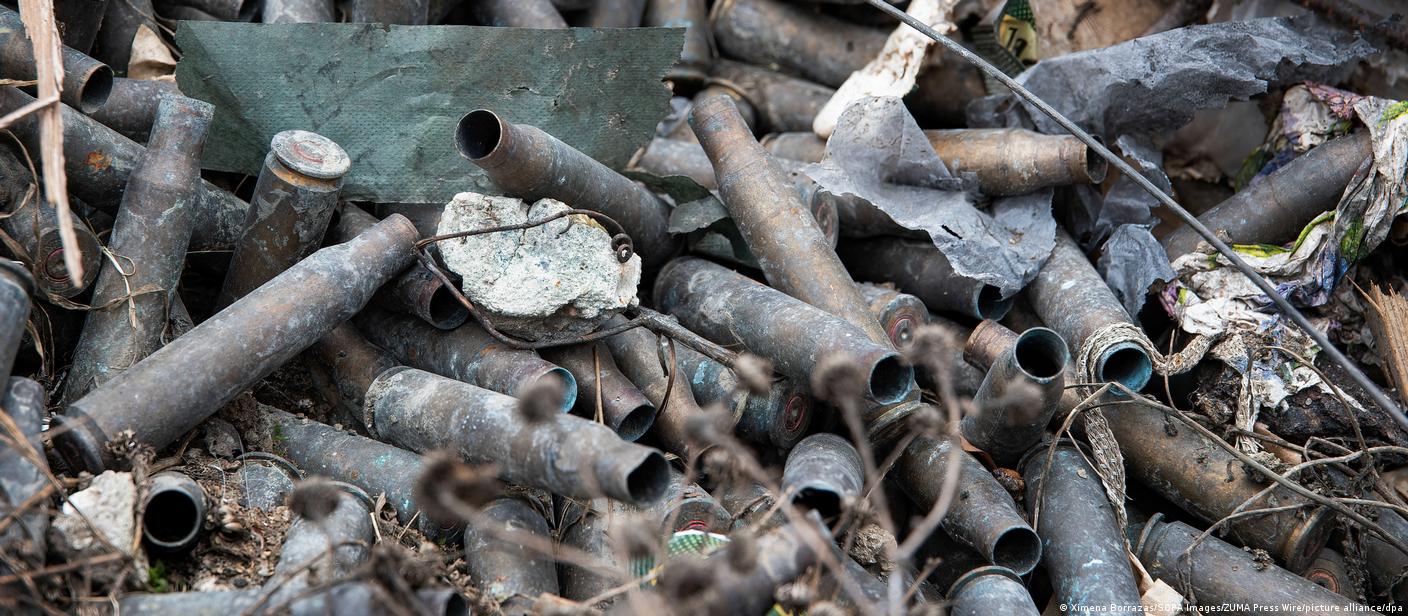SCIENCEUKRAINE
Ukraine: How the war is making soil and water toxic
Julia Vergin
03/07/2023March 7, 2023
Bombs and other ammunition contain lead, mercury, and TNT. That means that even when the war ends, toxic elements will still pose a threat to people, animals, and the environment.
https://p.dw.com/p/4OLOh
At some point, the war in Ukraine will end, hopefully. But even when it does, when the deathly explosions of all the rockets and bombs cease, their destructive potential will be far from exhausted.
The grenades, mines, and other explosive shots have destroyed buildings, and that has released asbestos into the environment. They have also hit refineries, allowing oil and other chemicals to leak into the ground and water systems. That’s not to mention the ammunition itself, which contains toxic elements. These corrosive chemicals have come to stay.
The news agency Reuters reported that at least 10.5 million hectares of agricultural land in Ukraine had been contaminated with chemicals, with ramifications for global food security.
Once those chemicals get into the soils and ground water, it may only be a matter of time before they are transmitted to humans via plants, animals, and drinking water.
At least, that is what toxicologists say could happen. They are not entirely sure how the environment will deal with these toxic substances, or what effect they could have on humans.
Explosives and heavy metals
“We’re only just starting to deal with the munitions left in the oceans,” said Edmund Maser, director of the Institute for Toxicology at the University Clinic in Kiel, Germany.
Many questions remain unanswered. But Maser’s research has led him and his team to one conclusion already — and that is that poisonous chemicals are bad news for organisms.
In the German parts of the North and Baltic Seas, Maser estimated there are 1.6 million tons of rusting munitions resting on the seabed.
As these munitions degrade and corrode, they release toxic chemicals into the water, endangering the ecosystem. Those toxins may ultimately end up in fish and other seafood that people eat.
TNT is carcinogenic
Among the most dangerous elements in munitions are the explosives themselves, and the heavy metals. That includes Trinitrotoluene, better known as TNT, a nitroaromatic compound known for its explosive power.
“We know through experiments on rats and mice that TNT is toxic,” said Maser, who has also observed how TNT from the sunken munitions is toxic for ocean life.
“TNT compromises the ability of marine life to reproduce, grow, and develop,” said Maser. “We also know from these studies that TNT and other explosives are carcinogenic.”
Mercury, arsenic, and lead destroy cells
Some heavy metals, such as arsenic and cadmium, are carcinogenic.
“Above all, the detonators contain heavy metals, such as mercury in the form of a fulminate that makes the TNT explode faster,” said Maser. A fulminate acts as a kind of catalyst.
As a heavy metal, mercury is also damaging for nerve cells: “It can lead to birth defects in unborn babies,” said Maser.
Lead has similar effects and can cause developmental disorders or miscarriages.
Kateryna Smirnova, a researcher at the Sokolovsky Institute for Soil Science and Agrochemistry Research at Ukraine’s National Academy of the Sciences, said that soil samples from Kharkiv — one of the major battle sites in the east of the country — had already shown higher concentrations of lead and cadmium.
Smirnova’s colleague, Oksana Naidyonova, a microbiologist at the Sokolovsky Institute, explained that heavy metals have a negative effect on bacteria in the soil.
“They inhibit the development of plants and the supply of micronutrients, which leads to physiological defects and reduces their ability to withstand disease,” Naidyonova said.
Ukraine war: Researchers on the run
05:50
But the chemicals will not necessarily stay in the soil. TNT, for example, could be carried away by the wind and distributed farther afield, said Maser. Rain could even reach some of the substances found deeper in the ground.
“The elements may then get into surface waters and contaminate streams, rivers, and lakes,” he said.
Based on his research in the North and Baltic Seas, Maser said it was possible that the munitions chemicals in Ukraine would enter the food chain.
“We are concerned that people could be at risk if they eat contaminated fish,” he said.
If the rains run off, allowing the chemicals to seep into the ground water, “that would mean drinking water was at risk of becoming contaminated,” Maser added.
If the water becomes contaminated this way, plants could consume mercury and other chemicals. If these plants happen to be crops like wheat or vegetables, then the same chemicals would end up on our dinner plates.
Will Ukraine’s soil be toxic forever?
Maser thinks the war will leave the Black Sea — off Ukraine’s southern coast, where a lot of the fighting has taken place — in a similar state as the North and Baltic Seas when this war is over. He said it will be a sea full of poisonous munitions that are easily forgotten.
His team are looking for ways to extract toxic TNT from the water. “We hope that bacteria could do it,” he said. But the researchers have yet to find a specimen that could be deployed systematically.
The toxicologist said it may be possible to remove the top layer of soil in Ukraine and use various processes to extract the heavy metals and TNT. Such methods are, however, expensive and take a long time.
Billions of damage in the ground
The experts DW contacted at Ukraine’s Sokolovsky Institute said they estimated the total damage could run to more than $15 billion (€14 billion). But they stressed that this was a preliminary calculation.
In any case, when we talk about removing heavy metals, all we mean is moving them from one location to another, where they would be less likely to harm people and other living things. As Maser told us, heavy metals are heavy metals forever: “You can’t get rid of them.”
This article was translated from German.






























